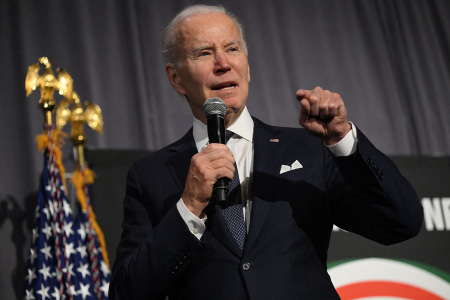Biden can't force religious employers to provide accommodations for elective abortions, court rules

Several Catholic organizations have prevailed, at least temporarily, in their efforts to block the Biden administration from enforcing a rule that would require them to provide their employees with accommodations for elective abortions in violation of their deeply held religious beliefs.
In an opinion released Monday, federal Judge David Joseph granted a preliminary injunction preventing the Biden administration from enforcing a rule interpreting the Pregnant Workers Fairness Act to require employers to provide their employees with accommodations in order to obtain an abortion against the United States Conference of Catholic Bishops, the Roman Catholic Dioceses of Lafayette and Lake Charles in Louisiana, along with The Catholic University of America and the states of Louisiana and Mississippi.
Joseph’s decision comes after the Catholic organizations filed a lawsuit in the U.S. District Court for the Western District of Louisiana last month asking a federal judge to strike down the rule. The states of Louisiana and Mississippi challenged the rule in a separate complaint and Joseph’s ruling covers both cases, which are now consolidated.
Joseph’s preliminary injunction prevents the Biden administration from enforcing the “requirement that covered entities provide accommodation for the elective abortions of employees that are not necessary to treat a medical condition related to pregnancy” against the states of Louisiana and Mississippi and their agencies, employers with 15 or more employees in the two states, as well as the Catholic organizations named as plaintiffs.
The ruling will remain in effect until “final judgment is entered in the consolidated cases.” Efforts to secure a permanent block against the rule are ongoing.
Passed as part of the Consolidated Appropriations Act of 2023, a massive omnibus bill approved by the United States Congress in 2022, the Pregnant Workers Fairness Act requires employers with 15 or more workers to accommodate the “pregnancy, childbirth, or related medical condition” of a “qualified employee.”
The law granted the Equal Employment Opportunity Commission the authority to “issue regulations” that “provide examples of reasonable accommodations addressing known limitations related to pregnancy, childbirth, or related medical conditions.” The regulations implemented by the executive branch agency last year include “having or choosing not to have an abortion” on a list of examples of what constitutes “pregnancy, childbirth, or related medical conditions” and, therefore, must be accommodated by employers.
The regulations also defined “related medical conditions” as “medical conditions which relate to, are affected by, or arise out of pregnancy or childbirth, as applied to the specific employee or applicant in question, including, but not limited to, termination of pregnancy, including via miscarriage, stillbirth, or abortion.”
Joseph, appointed to the bench by former President Donald Trump, determined that the EEOC “likely exceeded its statutory authority in including an abortion accommodation mandate in the Final Rule.”
Maintaining that “‘abortion’ is a term that is widely understood by everyone,” Joseph wrote, “If Congress had intended to mandate that employers accommodate elective abortions under the PWFA, it would have spoken clearly when enacting the statute, particularly given the enormous social, religious, and political importance of the abortion issue in our nation.”
Instead, he noted, “Lawmakers from both sides of the aisle expressly stated that the PWFA does not address abortion” as the measure was under consideration.
Laura Wolk Slavis, counsel at the law firm Becket that is representing the Catholic organizations, cheered Monday’s decision in a statement describing the ruling as “an important step in ensuring that American workplaces can be free to continue serving their communities consistent with their beliefs.”
Slavis added, “The EEOC twisted a law protecting expecting mothers and their babies and co-opted the workplaces of over 130 million Americans to support abortion.”
“That is an abuse of power — no one should have to choose between their conscience and protecting pregnant women,” she added. “Banning employers nationwide from affirming life is unacceptable and unlawful.”
As Becket explained, “The federal government has 60 days to appeal the decision.” Any appeal would go before a panel of judges on the U.S. Court of Appeals for the Fifth Circuit.
Ryan Foley is a reporter for The Christian Post. He can be reached at: ryan.foley@christianpost.com





















